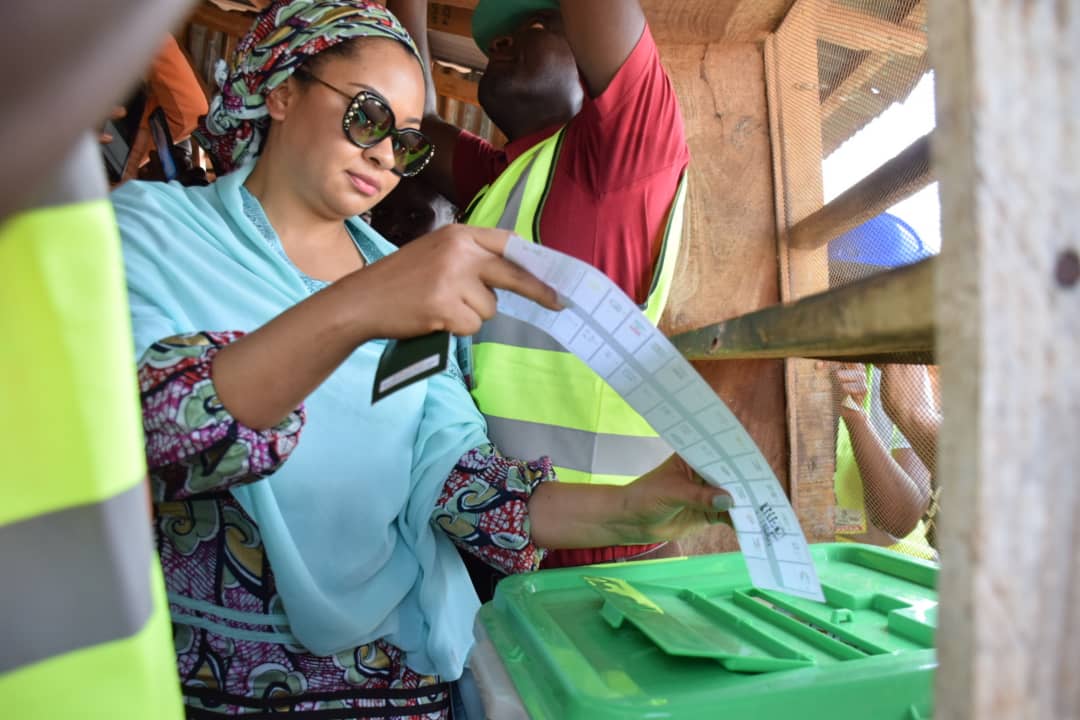A recall petition against Natasha Akpoti-Uduaghan, senator representing Kogi central, has sparked debate over Nigeria’s constitutional provisions for removing lawmakers.
Some members of the Kogi central constituency submitted a petition to the Independent National Electoral Commission (INEC) on Monday requesting the recall of Akpoti-Uduaghan.
Charity Omole, a representative of the constituents, said they submitted the petition to recall the senator because the constituency cannot afford not to have a representative in the senate.
“We have come to recall her so that we can have a representative in the senate. We are here to tell INEC to please follow the constitutional process for a recall so that a recall process can begin,” Omole said.
“We are the ones that voted for her, and we don’t want her anymore because we cannot afford not to have a representative. Nobody is bankrolling us. Nobody has any personal issue with her. It is just what it is. The game is the game”.
To recall a federal lawmaker, a petition must be submitted to the commission’s chairman, signed by more than 50 per cent of the registered voters in the constituency, followed by verification and then a referendum.
The law requires that the recall process be completed within 90 days from the date the petition is received.
While 250,000 registered voters allegedly signed the petition to recall Akpoti-Uduaghan, the figure dwarfs the 106,000 total votes cast in the February 2023 general election that elected her to the senate.
THE NUMBERS BEHIND THE RECALL CONTROVERSY

Kogi central has 488,000 registered voters, but only “250,000” signatures — representing about 43% of the electorate — were submitted for the recall process.
In contrast, the 2023 senatorial election saw a total voter turnout of approximately 106,000, with Abubakar Sadiku-Ohere of the All Progressives Congress (APC) securing 52,087 votes against Akpoti-Uduaghan of the Peoples Democratic Party (PDP), who polled 51,763.
Akpoti-Uduaghan initially lost the election but was later declared the winner after a tribunal uncovered inflated votes for her opponent.
However, the recall process is determined by the number of registered voters, not voter turnout.
WHY RECALL PROCESS FAVOURS REGISTERED VOTERS, NOT ACTUAL VOTERS
In Nigeria, removing a lawmaker through a recall follows strict rules set by the 1999 constitution and the Electoral Act. First, more than half of the registered voters in the area must sign a petition. For example, in Kogi central, more than 244,000 voters need to sign. Technically, the number needed might be around 290,000 because it is anticipated that some signatures will be disqualified.
After that, the INEC will check if the signatures are real. If the petition is valid, a recall election is held. For the lawmaker to be removed, most people must vote “yes”, and at least half of all registered voters must take part in the election.
After that, the INEC will check if the signatures are real. If the petition is valid, a recall election is held. For the lawmaker to be removed, most people must vote “yes”, and at least half of all registered voters must take part in the election.
As it is, the 250,000 signatures fall short of the 290,000 threshold, raising questions about the petition’s validity. However, the federal high court in Lokoja recently allowed the process to proceed, citing constitutional rights.
THE CONTROVERSIES BEFORE THE RECALL MOVE
The recall process didn’t happen suddenly. A series of events over the past few weeks had placed Akpoti-Uduaghan in the eye of the storm.
Akpoti-Uduaghan had recently accused Senate President Godswill Akpabio of sexually harassing her.
The allegation came in the wake of her seating arrangement altercation with Senate President Godswill Akpabio at the red chamber
She was subsequently suspended from the senate for six months for “gross misconduct” over the debacle.
Some of her constituents behind the recall move also alleged “gross misconduct, abuse of office, and deceitful behaviour”, though she has denied wrongdoing and called the recall effort a “coordinated suppression” of her voice.
Akpoti-Uduaghan may contest the process, as seen in earlier court injunctions.
Meanwhile, INEC said the representatives of petitioners seeking Akpoti-Uduaghan’s recall failed to provide their contact details.
The electoral umpire said the petitioners came with six bags of documents containing “signatures from 474,554 registered voters” in the district
WHY THIS MATTERS?
The gap between recall “signatures” (250,000 and later 474,554) and actual votes in the election (106,000) brings to the fore a systemic issue.
With 40% of registered voters abstaining in the 2023 election, the system could be exploited by groups using low turnout or inflated voter rolls to their advantage.
The recall effort raises questions about Nigeria’s democratic safeguards against political vendettas.
For now, Akpoti-Uduaghan remains suspended, while the recall process faces a tough challenge in meeting constitutional requirements.
HISTORICAL CONTEXT
No Nigerian lawmaker has ever been successfully recalled since the 1999 constitution introduced the process. Many attempts have been made, but none have met the legal requirements.
One famous example is the 2017 attempt to recall Dino Melaye, who was the senator for Kogi west at the time. Even though over 188,000 people reportedly signed the petition, the process failed because few voters showed up for INEC’s verification.
Past failures show how difficult it is to recall an elected lawmaker in Nigeria.
The current effort in Kogi central faces the same challenges, raising questions about whether the recall process truly holds leaders accountable or is just a political tool. (The Cable)


